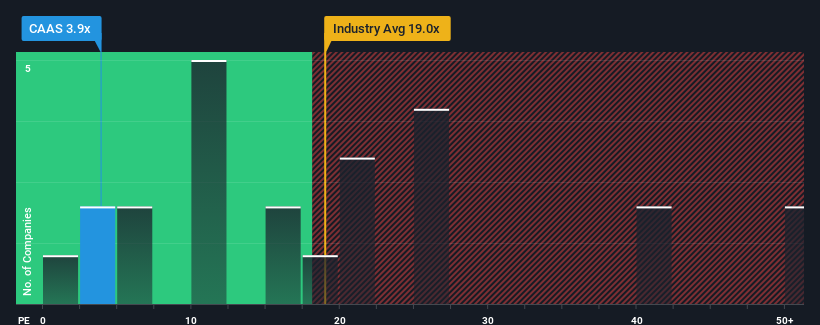- United States
- /
- Auto Components
- /
- NasdaqCM:CAAS
Further Upside For China Automotive Systems, Inc. (NASDAQ:CAAS) Shares Could Introduce Price Risks After 26% Bounce
Despite an already strong run, China Automotive Systems, Inc. (NASDAQ:CAAS) shares have been powering on, with a gain of 26% in the last thirty days. Taking a wider view, although not as strong as the last month, the full year gain of 20% is also fairly reasonable.
In spite of the firm bounce in price, given about half the companies in the United States have price-to-earnings ratios (or "P/E's") above 19x, you may still consider China Automotive Systems as a highly attractive investment with its 3.9x P/E ratio. Nonetheless, we'd need to dig a little deeper to determine if there is a rational basis for the highly reduced P/E.
The earnings growth achieved at China Automotive Systems over the last year would be more than acceptable for most companies. It might be that many expect the respectable earnings performance to degrade substantially, which has repressed the P/E. If you like the company, you'd be hoping this isn't the case so that you could potentially pick up some stock while it's out of favour.
Check out our latest analysis for China Automotive Systems

Is There Any Growth For China Automotive Systems?
There's an inherent assumption that a company should far underperform the market for P/E ratios like China Automotive Systems' to be considered reasonable.
If we review the last year of earnings growth, the company posted a terrific increase of 23%. The strong recent performance means it was also able to grow EPS by 560% in total over the last three years. Accordingly, shareholders would have probably welcomed those medium-term rates of earnings growth.
This is in contrast to the rest of the market, which is expected to grow by 15% over the next year, materially lower than the company's recent medium-term annualised growth rates.
In light of this, it's peculiar that China Automotive Systems' P/E sits below the majority of other companies. It looks like most investors are not convinced the company can maintain its recent growth rates.
The Key Takeaway
Even after such a strong price move, China Automotive Systems' P/E still trails the rest of the market significantly. Generally, our preference is to limit the use of the price-to-earnings ratio to establishing what the market thinks about the overall health of a company.
We've established that China Automotive Systems currently trades on a much lower than expected P/E since its recent three-year growth is higher than the wider market forecast. When we see strong earnings with faster-than-market growth, we assume potential risks are what might be placing significant pressure on the P/E ratio. At least price risks look to be very low if recent medium-term earnings trends continue, but investors seem to think future earnings could see a lot of volatility.
Many other vital risk factors can be found on the company's balance sheet. You can assess many of the main risks through our free balance sheet analysis for China Automotive Systems with six simple checks.
If these risks are making you reconsider your opinion on China Automotive Systems, explore our interactive list of high quality stocks to get an idea of what else is out there.
New: AI Stock Screener & Alerts
Our new AI Stock Screener scans the market every day to uncover opportunities.
• Dividend Powerhouses (3%+ Yield)
• Undervalued Small Caps with Insider Buying
• High growth Tech and AI Companies
Or build your own from over 50 metrics.
Have feedback on this article? Concerned about the content? Get in touch with us directly. Alternatively, email editorial-team (at) simplywallst.com.
This article by Simply Wall St is general in nature. We provide commentary based on historical data and analyst forecasts only using an unbiased methodology and our articles are not intended to be financial advice. It does not constitute a recommendation to buy or sell any stock, and does not take account of your objectives, or your financial situation. We aim to bring you long-term focused analysis driven by fundamental data. Note that our analysis may not factor in the latest price-sensitive company announcements or qualitative material. Simply Wall St has no position in any stocks mentioned.
About NasdaqCM:CAAS
China Automotive Systems
Through its subsidiaries, manufactures and sells automotive systems and components in the People’s Republic of China, the United States, and internationally.
Excellent balance sheet and good value.
Similar Companies
Market Insights
Weekly Picks

THE KINGDOM OF BROWN GOODS: WHY MGPI IS BEING CRUSHED BY INVENTORY & PRIMED FOR RESURRECTION


Why Vertical Aerospace (NYSE: EVTL) is Worth Possibly Over 13x its Current Price


The Quiet Giant That Became AI’s Power Grid
Recently Updated Narratives

Growing between 25-50% for the next 3-5 years

SLI is share to watch next 5 years


The "Molecular Pencil": Why Beam's Technology is Built to Win
Popular Narratives


MicroVision will explode future revenue by 380.37% with a vision towards success


NVDA: Expanding AI Demand Will Drive Major Data Center Investments Through 2026




